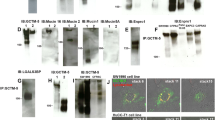Summary
Kinetics of carcinoembryonic antigen (CEA) and carbohydrate antigen 19-9 (CA19-9) production in a human pancreatic cancer cell line (SUTT-2) were investigated. Production of CEA reached a maximum, 31.0 ng/1 X 106 cells, in the late stationary phase with transient decline during the early exponential phase and 15.5% of the produced CEA was released into the medium, while production of CA19-9 reached a maximum, 421 U/l X 106 cells, in the early stationary phase and 68.8% of the produced CA19-9 was released into the medium. Accordingly, the kinetics of CEA and CA19-9 production of SUIT-2 in vitro might be independent. CEA was stained immunohistochemically in the cytoplasm of the cells forming small buds above the monolayer cell sheet. On the contrary, CA19-9 positive cells were observed scattered in the monolayer cell sheet and CA19-9 was stained in the cytoplasm, predominantly at the projections of the cell surface. CEA and CA19-9 were also detected in the sera of nude mice bearing SUIT-2 tumors and their concentrations correlated well with tumor volume. Correlation coefficients between tumor markers and tumor volume were 0.79 (p<0.01) for CEA and 0.90 (p<0.01) for CA19-9.
Similar content being viewed by others
References
National Institutes of Health Consensus Development Conference Statement. Carcinoembryonic antigen: its role as a marker in the management of cancer. Cancer Res 1981; 41: 2017–2018
DelVillano BC, Brennan S, Brock P, et al: Radio-immunometric assay for a monoclonal antibodydefined tumor marker, CA19-9. Clin Chem 1983; 29: 549–552
Leibovitz A, Stinson JC, McCombs WB, et al: Classification of human colorectal adenocarcinoma cell lines. Cancer Res 1976; 36: 4562–4569
Ellison ML, Lamb D, Rivett J, et al: Quantitative aspects of carcinoembryonic antigen output by a human lung carcinoma cell lines. J Natl cancer Inst 1977; 59: 309–312
Drewinko B, Yang LY: Observations on the synthesis of carcinoembryonic antigen by an established human colonic carcinoma cell line. Oncology 1980; 37: 89–95
Motoyama T, Watanabe H: Carcinoembryonic antigen production in human gastric cancer cell lines in vitro and in nude mice. Jpn J Cancer Res 1983; 74: 679–686
Shi ZR, Tsao D, Kim YS: Subcellular distribution, synthesis, and release of carcinoembryonic antigen in cultured human colon adenocarcinoma cell lines. Cancer Res 1983; 43: 4045–4049
McBain JA, Weese JL, Meisner LF, et al: Establishment and characterization of human colorectal cancer cell lines. Cancer Res 1984; 44: 5813–5821
Kyriazis AP, McCombs III WB, Sandberg AA, et al: Establishment and characterization of human pancreatic adenocarcinoma cell line SW-1990 in tissue culture and the nude mouse. Cancer Res 1983; 43: 4393–4401
Meitner PA, Kajiji SM, LaPosta-Frazier N, et al: “COLO 357,” a human pancreatic adenosquamous carcinoma: Growth in artificial capillary culture and in nude mice. Cancer Res 1983; 43: 5978–5985
Ichiki S, Kuroki M, Matsunaga A, et al: Production of immunoreactive calcitonin and some other tumor markers by established human carcinoma cell lines. Jpn J Cancer Res 1986; 77: 270–275
Klug TL, Salzman S, Quinn A, et al: Tumorigenicity in athymic mice of the human colon carcinoma cell line SW1116 expressing the tumor-associated antigenic determinant CA19-9. Cancer Res 1984; 44: 5212–5218
Yamaguchi N, Morioka H, Ohkura H, et al: Establishment and characterization of the human cholangiocarcinoma cell line HChol-Yl in a serum free, chemically defined medium. J Natl Cancer Inst 1985; 75: 29–35
Steplewski Z, Chang TH, Herlyn M, et al: Release of monoclonal antibody-defined antigens by human colorectal carcinoma and melanoma cells. Cancer Res 1981; 41: 2723–2727
Iwamura T, Katsuki T, Ide K: Establishment and characterization of a human pancreatic cancer cell line producing carcinoembryonic antigen and carbohydrate antigen 19-9. Jpn J Cancer Res 1987; 78: 54–62
Lowry OH, Rosenbrough NJ, Farr AL, et al: Protein measurement with the Folin phenol reagent. J Biol Chem 1951; 193: 265–275
Koprowski H, Steplewski Z, Mitchell K, et al: Colorectal carcinoma antigens determined by hybridoma antibodies. Somatic cell Genetics 1979; 5: 957–972
Author information
Authors and Affiliations
Additional information
This study was supported in part by a Grant-in-Aid for Encouragement of Young Scientists from the Ministry of Education, Science and Culture (62770973).
Rights and permissions
About this article
Cite this article
Iwamura, T., Katsuki, T. Kinetics of carcinoembryonic antigen and carbohydrate antigen 19-9 production in a human pancreatic cancer cell line (SUIT-2). Gastroenterol Jpn 22, 640–646 (1987). https://doi.org/10.1007/BF02776726
Received:
Accepted:
Issue Date:
DOI: https://doi.org/10.1007/BF02776726




